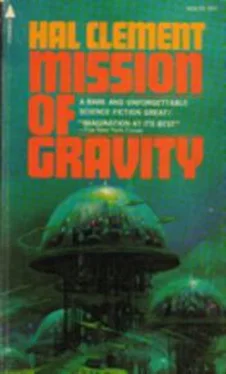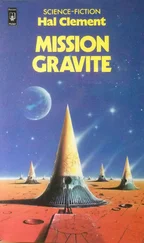Hal Clement - Mission of Gravity
Здесь есть возможность читать онлайн «Hal Clement - Mission of Gravity» весь текст электронной книги совершенно бесплатно (целиком полную версию без сокращений). В некоторых случаях можно слушать аудио, скачать через торрент в формате fb2 и присутствует краткое содержание. Жанр: Фантастика и фэнтези, на английском языке. Описание произведения, (предисловие) а так же отзывы посетителей доступны на портале библиотеки ЛибКат.
- Название:Mission of Gravity
- Автор:
- Жанр:
- Год:неизвестен
- ISBN:нет данных
- Рейтинг книги:4 / 5. Голосов: 1
-
Избранное:Добавить в избранное
- Отзывы:
-
Ваша оценка:
- 80
- 1
- 2
- 3
- 4
- 5
Mission of Gravity: краткое содержание, описание и аннотация
Предлагаем к чтению аннотацию, описание, краткое содержание или предисловие (зависит от того, что написал сам автор книги «Mission of Gravity»). Если вы не нашли необходимую информацию о книге — напишите в комментариях, мы постараемся отыскать её.
Mission of Gravity — читать онлайн бесплатно полную книгу (весь текст) целиком
Ниже представлен текст книги, разбитый по страницам. Система сохранения места последней прочитанной страницы, позволяет с удобством читать онлайн бесплатно книгу «Mission of Gravity», без необходимости каждый раз заново искать на чём Вы остановились. Поставьте закладку, и сможете в любой момент перейти на страницу, на которой закончили чтение.
Интервал:
Закладка:
With the route agreed on, there was little more for Lackland to do while Mesklin drifted along its orbit toward the next equinox. That would not be too long, of course; with the southern hemisphere’s midwinter occurring almost exactly at the time the giant world was closest to its sun, orbital motion during fall and winter was extremely rapid. Each of those seasons was a shade over two Earthly months in length-spring and summer, on the other hand, each occupied some eight hundred and thirty Earth days, roughly twenty-six months. There should be plenty of time for the voyage itself.
Lackland’s enforced idleness was not shared aboard the Bree. Preparations for the overland journey were numerous and complicated by the fact that no member of the crew knew exactly what the ship would have to face. They might have to make the entire journey on stored food; there might be animal life along the way sufficient not only to feed them but to provide trading material if its skins and bones were of the right sort. The trip might be. as safe as the sailors avowedly believed all land journeys to be, or they might face dangers from both the terrain, — and the creatures inhabiting it. About the first they could do little; that was the Flyer’s responsibility. Concerning the second, weapons were brought to a high degree of readiness. Bigger clubs than even Hars or Terblannen could swing up in the higher latitudes were manufactured; some of the plants which stored crystals of chlorine in their stems were found, and the flame tanks replenished from them. There were, of course, no projectile weapons; the idea had never developed on a world where none of the inhabitants had ever seen a solid, unsupported object because it fell too fast to be visible. A.50-caliber bullet fired horizontally at Mesklin’s pole would drop over one hundred feet in its first hundred yards of travel. Barlennan, since meeting Lackland, had come to have some idea of the „throw” concept and had even considered asking the Flyer about the possibility of weapons based on the principle; but he had decided to stick to more familiar arms. Lackland, on his part, had done a little wondering about the possible results of meeting a race, on their trip across the isthmus, which had developed the bow and arrow. He did a little more than Barlennan with the thought; he outlined the situation to Rosten and asked that the towing tank be equipped with a 40-millimeter gun with thermite and explosive shells. After the usual grumbling Rosten had acquiesced.
The sled was finished easily and quickly; large amounts of sheet metal were available, and the structure was certainly not complicated. Following Lackland’s advice, it was not brought to the surface of Mesklin immediately, since the storms were still depositing their loads of ammonia-tainted methane snow. The ocean level had still not risen appreciably near the equator, and the meteorologists had been making unkind remarks at first about Barlennan’s truthfulness and linguistic ability; but as sunlight reached farther and farther into the southern hemisphere with the approach of spring, and new photographs were secured and compared with those of the preceding fall, the weather men grew silent and were observed wandering around the station muttering distractedly to themselves. The sea level in the higher latitudes had already risen several hundreds of feet, as the native had predicted, and was still rising visibly as the days went by.
The phenomenon of widely differing sea levels at the same time on the same planet was a little outside the experience of Earth-trained meteorologists, and none of the non-human scientists with the expedition could throw any light on the matter, either. The weather men were still racking their brains when the sun’s diurnal arc eased southward past the equator and spring officially began in Mesklin’s southern hemisphere.
The storms had decreased tremendously both in frequency and intensity long before this time, partly because the planet’s extreme flattening had cut down the radiation on the north polar cap very rapidly after midwinter and partly because Mesklin’s distance from the sun had increased more than fifty per cent during the same time; Barlennan, when consulted on the matter, proved perfectly willing to start the journey with the astronomical advent of spring, and showed no apparent anxiety about equinoctial gales.
Lackland reported the” natives’ readiness to the station on the inner moon, and the operation of transferring tank and sled to the surface was started at once; everything had been in readiness for weeks.
Two trips of the cargo rocket were necessary, though the sledge was light and the thrust developed by the hydrogen-iron slugs fantastically high. The sled was brought down first, with the intention of letting the crew of the Bree haul it onto the structure while the rocket went back for the tank; but Lackland warned against landing close to the ship, so that the clumsy-looking vehicle was left beside the dome until the tractor arrived to tow it over to the shore. Lackland himself drove the tractor, although the crew of the rocket stood by to satisfy their curiosity and, if needed, lend assistance with the loading procedure.
No human help was needed. The Mesklinites, under a mere three Earth gravities, were perfectly capable physically of lifting their ship and walking off with it; and the insuperable mental conditioning that prevented their getting any part of their bodies underneath such a mass did not prevent their towing it easily across the beach with ropes — each crewman, of course, anchored firmly to a tree with one or both sets of rear pincers. The Bree, sails furled and centerboards retracted, slid easily across the sand and onto the gleaming platform of metal. Barlennan’s winter-long vigilance to keep her from freezing to the beach had proved adequate; also, in the last couple of weeks, the ocean level had started to rise as it had already done farther south. The advancing liquid, which had already necessitated moving the vessel two hundred yards inland, would certainly have melted her free had that been necessary.
The builders of the sledge, on distant Toorey, had provided eyes and cleats in sufficient numbers to allow the sailors to lash the Bree firmly in place. The cordage used appeared remarkably thin to Lackland, but the natives showed full confidence in it. They had some justice, the Earthman reflected; it had held their ship on the beach during storms when he himself would not have cared to walk abroad in full armor. It might, he reflected, be worth while to find out if the cordage and fabric the Mesklinites used could stand terrestrial temperatures.
This train of thought was interrupted by Barlennan’s approach with the report that all was ready on the ship and sledge. The latter was already attached to the tank by its tow cable; the tank itself was stocked with sufficient food to last its one-man crew for several days. The plan was to re-supply Lackland by rocket whenever necessary, landing far enough ahead so that the flying rocket would not cause too much perturbation to the natives on the ship. This was not to be done oftener than strictly necessary; after the first accident, Lackland did not intend to open the tank to the outer air oftener than he could possibly help.
„I guess we’re ready to go, then, little friend,” he said in response to Barlennan’s statement. „I won’t need sleep for a good many hours yet, and we can get quite a distance upstream in that time. I wish your days were of a decent length; I’m not too happy about driving over a snow field in the dark. I don’t think even your crew could pull the tank out of a hole, even if they could find the traction.”
„I rather doubt it myself, though my ability to judge weight is very uncertain here at the Rim,” the captain replied. „I doubt that the risk is very great, however; the snow isn’t sticky enough to do a good job of covering a large hole.”
Читать дальшеИнтервал:
Закладка:
Похожие книги на «Mission of Gravity»
Представляем Вашему вниманию похожие книги на «Mission of Gravity» списком для выбора. Мы отобрали схожую по названию и смыслу литературу в надежде предоставить читателям больше вариантов отыскать новые, интересные, ещё непрочитанные произведения.
Обсуждение, отзывы о книге «Mission of Gravity» и просто собственные мнения читателей. Оставьте ваши комментарии, напишите, что Вы думаете о произведении, его смысле или главных героях. Укажите что конкретно понравилось, а что нет, и почему Вы так считаете.












